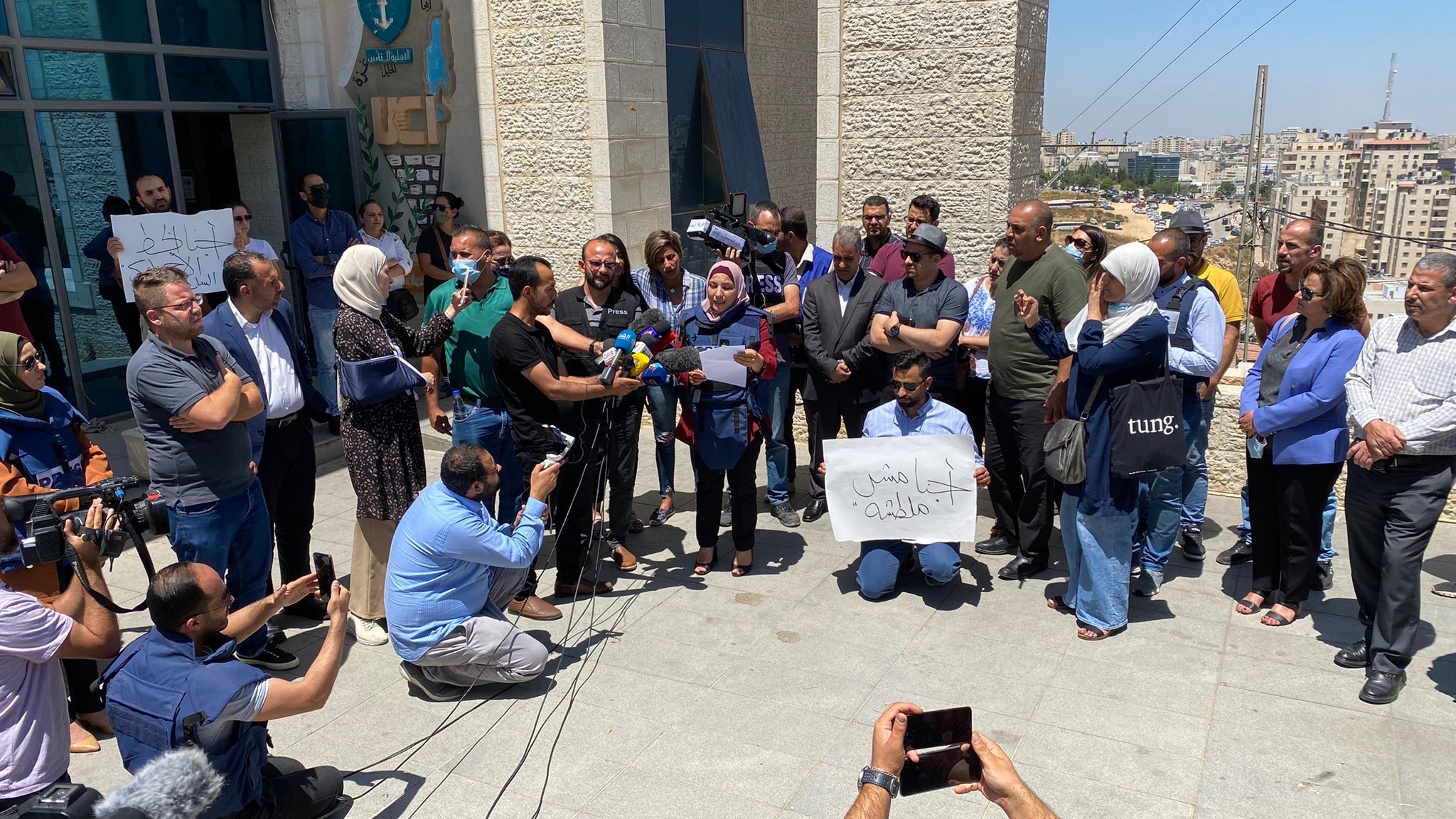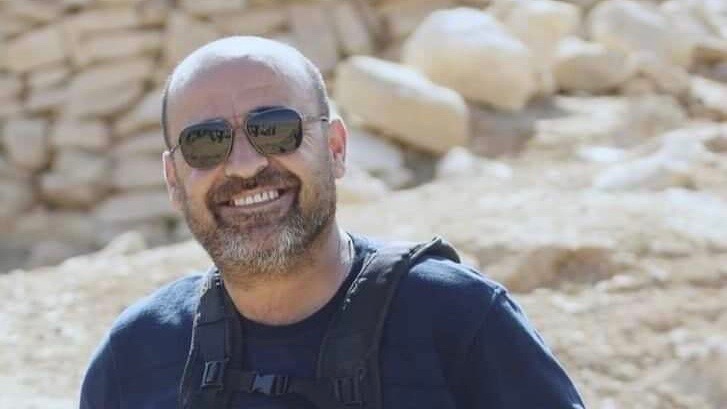Peoples Dispatch
 Palestinian journalists protest in front of the UN office in Ramallah. (Photo: Twitter/ Alaa Daraghme)
Palestinian journalists protest in front of the UN office in Ramallah. (Photo: Twitter/ Alaa Daraghme)
Palestinian journalists also staged a vigil outside the UN office to protest against the PA security forces for attacking and intimidating them while they were covering the protests, and demanded protection
For the fifth consecutive day, thousands of Palestinians took part in protests across the occupied West Bank against the Palestinian Authority (PA), multiple news sources reported on Monday, June 28. The protests were sparked by the death of political activist Nizar Banat, an anti-corruption figure and a critic of the PA. He died in custody on June 24 after being picked up in a raid at his home by the PA security forces.
Protests against Banat’s death were met with brutality and violence by Palestinian police officers in plain clothes and riot police. They used tear gas, stun grenades, metal batons, rocks and physical force against the protesters while trying to disperse them. Protests were also reported from Ramallah, Bethlehem, Hebron, and several smaller towns like al-Bireh. According to local medical sources, at least 20 people were injured in the police crackdown against the protesters during the five days.
The protesters have demanded the resignation of president Mahmoud Abbas, holding him responsible for Banat’s death and for the oppressive rule of the PA government. Protesters were seen waving the Palestinian flag and carrying portraits of Banat, raising slogans like “the people want to overthrow the regime”, “step down, Abbas!” and “your blood won’t be in vain”. They also demanded that the government initiate an independent and impartial investigation into Banat’s death and bring those responsible to justice.
Anger among protesters escalated in the last couple of days after Banat’s autopsy report revealed that the time between his arrest and death was less than an hour and that he had suffered multiple fractures. He had injury marks and bruises on his head, chest, neck, legs and hands, and internal bleeding from his lungs. This indicated that he was brutally beaten and tortured before his death.
Later, counter-rallies were organized by supporters of the PA, which saw the participants play patriotic songs on loudspeakers and wave flags of Abbas’ ruling Fatah party.
The security forces and riot police also reportedly threatened and manhandled journalists and human rights workers who were doing their work. As per reports, they confiscated journalists’ phones and professional equipment, damaged cameras, and also injured several journalists. Human rights workers who were present at the protest sites to observe and monitor the situation were attacked and forced out of the area and had their phones confiscated. According to statistics obtained by press freedom watchdog Reporters Without Borders, at least 12 Palestinian journalists, including five women, were assaulted by the riot police and security forces during the protests over the weekend. One journalist was summoned by PA’s General Intelligence Service for interrogation.
Later, journalists affiliated with the Palestinian Journalists’ Syndicate assembled outside the UN office in Ramallah and demanded that the international body intervene to protect them and guarantee press freedoms in Palestine. The journalists gave a letter urging the UN to “take necessary and immediate measures” to protect media freedom. In a statement, they demanded PA prime minister Mohammed Shtayyeh to fire the police chief for the violent attacks on journalists and protesters.
The Syndicate has also decided to issue a call to all local and international news media to boycott the PA presidency and government press briefings. Several Palestinian journalists cut their press cards in protest. Several human rights organizations and the UN have denounced the PA’s violent crackdown on protesters and journalists, expressing shock at the use of force against protesters, journalists and rights workers. They called upon the PA to ensure freedom of opinion, expression, assembly, and the press. The UN said it has raised these concerns with the government authorities through official channels in direct meetings.
Political activist Nizar Banat dies after night raid by Palestinian forces
Abhijan Choudhury
 Nizar Banat. (Photo: Twitter/Abir Kopty)
Nizar Banat. (Photo: Twitter/Abir Kopty)
Prominent Palestinian political activist and a fierce critic of the Palestinian Authority (PA), Nizar Banat, died on Thursday, June 24, after a violent night raid at his home by a large contingent of Palestinian security and intelligence forces in the town of Dura in Hebron district of the occupied West Bank, as per multiple news sources. His family has accused the security forces of beating him to death while he was in their custody and withholding his body several hours after his death.
43-year-old Banat was a vocal opponent and critic of the Palestinian Authority government and president Mahmoud Abbas, and had regularly highlighted the widespread corruption and internal repression carried out by the Palestinian administration against its own citizens. He also planned to run in May as a candidate in the now postponed Palestinian legislative elections under the Freedom and Dignity electoral list.
According to statements by Banat’s family members, close to 25 Palestinian security forces and intelligence personnel showed up at his home at around 3:30 am on Thursday without any warning or advance notice and blew up the doors and windows. They then beat him with wooden and metal batons and sprayed pepper spray on his face, mouth and nose. He was subsequently stripped naked and forcibly dragged away to a military vehicle. The security forces did not provide any reasons for the late night arrest. Later, the governor of Hebron, Jibreen Al-Bakri, in a statement said that Banat’s health had “deteriorated” as a result of which he was “transferred to the Hebron Governmental Hospital. Subsequently, doctors examined him and declared the citizen dead.” The government has ordered an investigation into his death.
Banat’s cousin Ammar told news outlets that the activist had been targeted several times previously, most recently in May when two unidentified attackers shot multiple rounds of ammunition along with stun grenades and tear gas at their home in an attempt to assassinate him. He had also been arrested multiple times by PA’s security forces. Banat’s family has demanded that the authorities disclose the full facts surrounding the circumstances of his death. They said in a statement, “we demand the formation of an international investigation committee headed by a doctor from the family and a doctor from the Human Rights Commission, and people chosen by the family, and that the autopsy not take place in the institutes affiliated with the authority, but in the Abu Kabir Forensic Institute in Tel Aviv. We want to take our right by law, and our son’s blood will not be shed in vain… We will know who took the decision to assassinate him and who carried out the assassination. And both of them we want to be punished.”
After news of his death at the hands of the Palestinian security forces spread, thousands of Palestinian protesters took part in demonstrations in the city of Ramallah in the occupied West Bank. Several protesters carried Banat’s photograph and raised slogans like “The arrests do not scare us”, “Leave, leave Abbas” and “The people want the downfall of the regime”. Palestinian security forces cracked down on the protesters and used metal batons and tear gas to disperse them.
Palestinian political parties and human rights organizations strongly condemned Banat’s death and called for a swift, impartial and independent investigation to find and punish those guilty. The Popular Front for the Liberation of Palestine (PFLP), in a statement strongly criticizing PA’s repression, said that “The arrest and then the assassination of Nizar again raises questions on the nature of the role and function of the PA and its security services, and its violation of the democratic rights of citizens through the policy of silence, prosecution, arrest and murder.”
Sami Abu Zuhri, political bureau member of Gaza-based Palestinian resistance group Hamas, said in a statement, “We consider that [PA] Prime Minister Mohammad Shtayyeh bears the primary responsibility for the murder of activist and parliamentary candidate Nizar Banat, and we call for the killers to be prosecuted.”
Human rights organizations such as the Palestinian Independent Commission for Human Rights and the Palestinian NGO Network also called for an independent investigation. NGO Network expressed concern about the continuing repression by the PA against its opposition and critics, saying that “it had the potential to turn into a police state governed by a system of repression and a disregard for people’s lives and their dignity in the reality of the occupation.”
Euro-Mediterranean Human Rights Monitor also condemned Banat’s killing and called for a diligent and independent investigation. It also called upon the PA to release all other political prisoners and prisoners of conscience who are still being illegally detained. The European human rights group estimated that around 150 Palestinians in the occupied West Bank and East Jerusalem have either been arrested or have had summons issued against them. It described the situation as a “dangerous and remarkable escalation” in the crackdowns carried out by Palestinian security services to curb freedom of speech and expression, political opposition, and any form of dissent in the occupied territories.